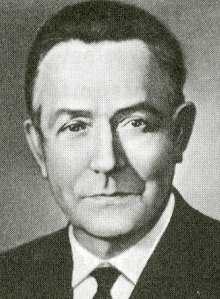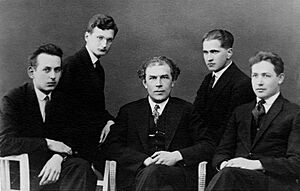Alfred Karindi facts for kids
Quick facts for kids
Alfred Karindi
|
|
|---|---|
 |
|
| Born |
Alfred-Nikolai Karafin
30 May 1901 Kõnnu, Illuka Parish, Governorate of Estonia
|
| Died | 13 April 1969 (aged 67) Tallinn, Estonia
|
| Nationality | Estonian |
| Occupation | Organist, composer |

Alfred Karindi (born Alfred-Nikolai Karafin) was an Estonian musician. He was a talented organist and a composer. He lived from May 30, 1901, to April 13, 1969.
Contents
Alfred Karindi's Life and Music
Early Life and Education
Alfred Karindi was born in a village called Kõnnu in Estonia. This was on May 30, 1901.
When he was 19, Alfred started studying music. He went to the Tartu Higher School of Music in 1920. There, he learned to play the organ from Johannes Kärt. He also studied how to compose music with Heino Eller. He finished his studies there in 1927.
After that, he continued his music education. He studied organ and composition at the Tallinn Conservatory. He learned from famous teachers like August Topman and Artur Kapp. He graduated from the Conservatory in 1931.
Alfred Karindi was part of a group of musicians. They were called the "Tartu school." These musicians all studied with Heino Eller. Other famous members included Eduard Tubin, Eduard Oja, Olav Roots, and Karl Leichter.
Teaching and Performing
Alfred Karindi loved to teach music. He taught at the Tartu 2nd primary school from 1921 to 1927. He also taught at the Tartu Higher Music School from 1925 to 1928. Later, he taught at the University of Tartu from 1928 to 1932.
He was also a church organist for many years. He played the organ at Tartu Maarja Church from 1925 to 1929. Then he played at the University of Tartu Church from 1929 to 1933. From 1933 to 1940, he was the organist at Tallinn Kaarli Church. People knew him as a very skilled organ player. He was especially good at making up music on the spot, which is called improvising.
Besides playing the organ, he also led many choirs. He conducted choirs in Tartu and Tallinn starting in 1925. From 1929 to 1933, he led the "Cantate Domino" mixed choir. This choir was from the University of Tartu Church. They performed concerts all over Estonia. They often played a famous piece called Mozart's Requiem.
Later Career and Legacy
In 1940, Karindi started teaching at the Tallinn State Conservatory. He taught music theory and organ. By 1944, he became the head of the theory department. In 1946, he was made a professor. He also played the organ again at Tallinn Kaarli Church in 1948.
In 1950, he faced a difficult time. He was held in a prison camp until 1954. After that, he was allowed to return home. From 1955 until he passed away in 1969, he was again a professor at the Tallinn State Conservatory.
In 1957, he started a new choir. It was called the Mixed Choir of Graduates of Higher Schools. He was the main conductor for this choir for the rest of his life.
Alfred Karindi wrote many different kinds of music. He composed music for choirs and for the organ. He also wrote songs for solo singers and pieces for small groups of instruments. He even wrote music for orchestras and large vocal works. His songs are often serious and complex.
One of his most popular pieces is "Lullaby." This is the second part of his Third Organ Sonata.
Alfred Karindi passed away in Tallinn on April 13, 1969. In 1986, a special plaque was put up in his home village of Kõnnu to remember him.

